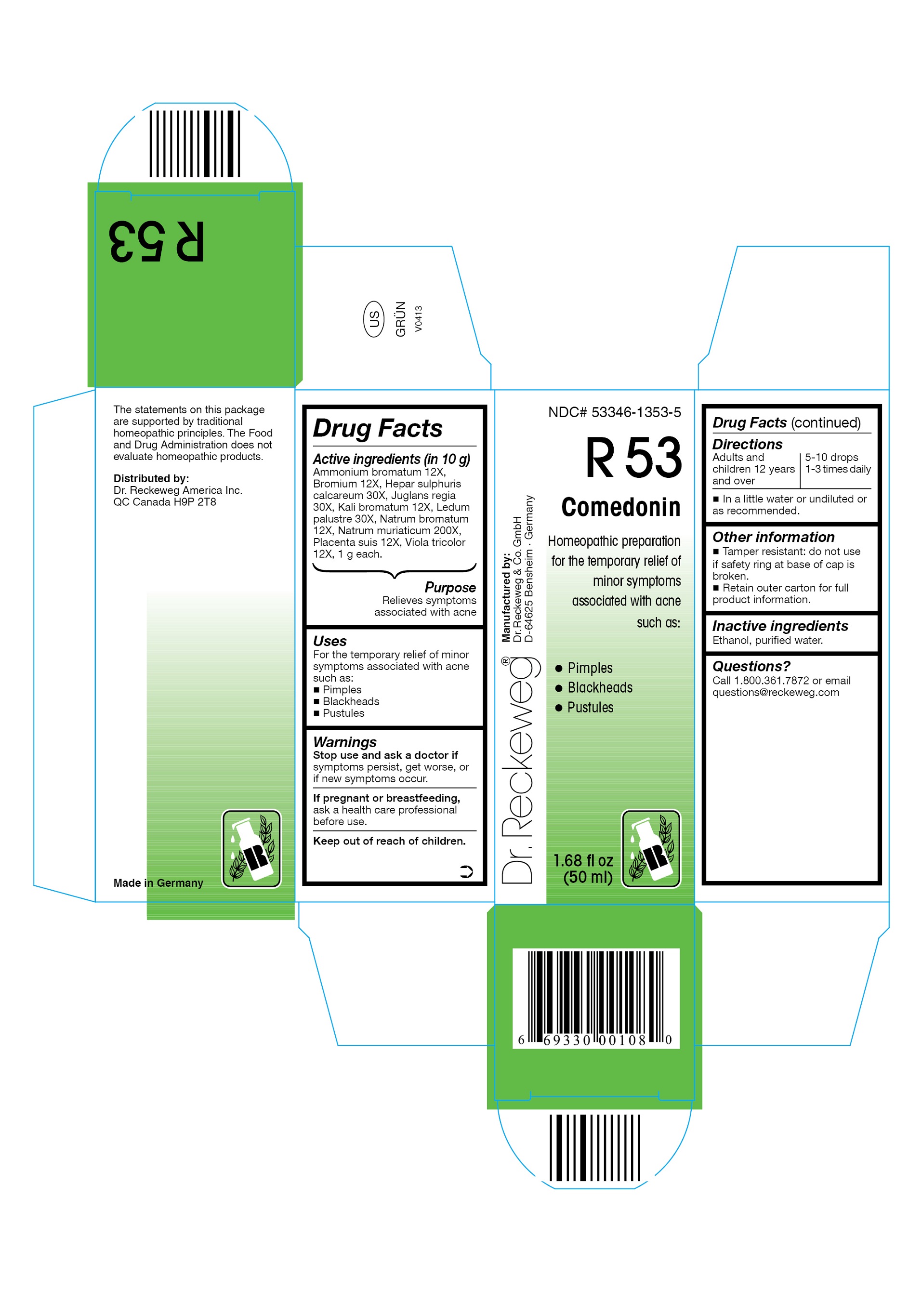Dr. Reckeweg R53 Comedonin Combination Product while Breastfeeding

What is Dr. Reckeweg R53 Comedonin Combination Product used for?
Brief: Relieves symptoms associated with acne
I am currently breastfeeding and I want to know if using Dr. Reckeweg R53 Comedonin Combination Product is safe for my kid? Does it have any effect on milk production?

Dr. Reckeweg R53 Comedonin Combination Product Breastfeeding Analsys
Bromine while Breastfeeding
Low RiskCAS Number: 7726-95-6
It is naturally found as a bromide, and, industrially used on processing fuels, natural gas, photography fluids, and as a tranquilizer (not longer recommended). Bromide liberates a red steam that is irritant and may enter the breast milk. Eczema and somnolence have been described. Mothers who would be labor exposed (photographic film development) should receive enough ventilation. Monitoring of blood level may be considered. Benefits of breastfeeding are largely more important than risk related to the presence of mild level environment pollutants in human milk, in many instances, they are at lower content than those found in cow’s milk or other foods. (Codex alimentarius FAO-WHO).
Calcium sulfide while Breastfeeding
SafeVarious calcium salts (Acetate, Carbonate, Chloride, Citrate, Phosphate, Gluceptate, Glucobionato, Lactate, Laxctobionato Pidolate, Silicate) are used in the management of hypocalcemia, supplements for treating calcium deficiency states and antacids ( Carbonate and Silicate) Daily requirement of calcium during lactation are 1 g (1.3 g in children under 20 years).Calcium supplements in the diet does not affect the concentration of calcium in milk.Excessive intake of calcium is not good for health. During lactation, consumption of calcium should not exceed 2.5 g a day. WHO List of Essential Medicines 2002 states that it is compatible with breastfeeding.
Potassium bromide while Breastfeeding
SafeCAS Number: 7447-40-7
Human milk has a potassium concentration of 13 meq/L, almost a half of rehydration solution content and a quarter of maximal IV recommended dose. Potassium supplementation does not alter milk concentration without increasing mother’s serum concentration, which is strictly limited from 3,5 to 5,5 meq/L.
Sodium bromide while Breastfeeding
SafeCAS Number: 7647-14-5
Sodium chloride either as cooking salt, or, as oral rehydration solution, or, as IV fluid, is entirely compatible with BF.
Sodium chloride while Breastfeeding
SafeCAS Number: 7647-14-5
Sodium chloride either as cooking salt, or, as oral rehydration solution, or, as IV fluid, is entirely compatible with BF.
Dr. Reckeweg R53 Comedonin Combination Product Breastfeeding Analsys - 2
Ledum palustre twig and Breastfeeding
UnsafeLabrador tea is a plant. The leaves and flowering shoots are used to make medicine. People take Labrador tea for sore throat, chest congestion, coughs, lung infections, and other chest ailments. They also take it for diarrhea, kidney problems, joint and muscle pain (rheumatism), headache, and cancer.
Women use it to cause an abortion or treat �female disorders.�Some people add Labrador tea to bath water or apply it directly to the skin to treat skin problems. The flowers and leaves of the plant are used to prepare tea. However, frequent intake of the same have some side effects like headaches, indigestion, cramps, and vomiting.
Labrador tea has narcotic properties. If taken in concentrations that are too high, it can cause symptoms of intoxication that can lead to paralysis and death. Due to its narcotic properties Its likely unsafe to use Labrador tea if you are breastfeeding. If you are pregnant It might cause an abortion.
What should I do if I am breastfeeding mother and I am already exposed to Dr. Reckeweg R53 Comedonin Combination Product?
Due to high dilution of ingredients in homeopathic medicines they do not create much problem for baby. Dr. Reckeweg R53 Comedonin Combination Product is a homeopathic medicine and if your baby does not have any abnormal symptoms then there is nothing to worry about. Be careful with too much usage of ethanol based homeopathic medicines during breastfeeding.
My health care provider has asked me to use Dr. Reckeweg R53 Comedonin Combination Product, what to do?
Homeopathic medicines are usually safe in breastfeeding and if Dr. Reckeweg R53 Comedonin Combination Product has been recommended by doctor then there should be no concern about its usage in breastfeeding.
If I am using Dr. Reckeweg R53 Comedonin Combination Product, will my baby need extra monitoring?
Not exactly.
Who can I talk to if I have questions about usage of Dr. Reckeweg R53 Comedonin Combination Product in breastfeeding?
US
National Womens Health and Breastfeeding Helpline: 800-994-9662 (TDD 888-220-5446) 9 a.m. and 6 p.m. ET, Monday through Friday
UK
National Breastfeeding Helpline: 0300-100-0212 9.30am to 9.30pm, daily
Association of Breastfeeding Mothers: 0300-330-5453
La Leche League: 0345-120-2918
The Breastfeeding Network supporter line in Bengali and Sylheti: 0300-456-2421
National Childbirth Trust (NCT): 0300-330-0700
Australia
National Breastfeeding Helpline: 1800-686-268 24 hours a day, 7 days a week
Canada
Telehealth Ontario for breastfeeding: 1-866-797-0000 24 hours a day, 7 days a week
